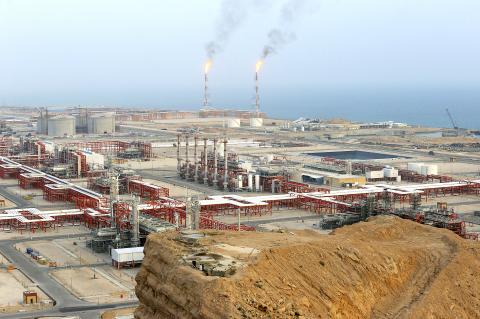China National Petroleum Corp (CNPC, 中國石油天然氣) is no longer a partner in Iran’s biggest natural gas project, and the Persian Gulf nation will develop Phase 11 of the giant South Pars field on its own, Iranian Minister of Oil Bijan Namdar Zanganeh said.
CNPC was the only international partner left in the project, after Total SA of France withdrew last year when US President Donald Trump abandoned the 2015 nuclear accord and reimposed sanctions on Iran.
Phase 11 was the biggest infrastructure development project with major foreign participants that Tehran arranged after the accord took effect.

Photo: AP
The Chinese company was “dismissed” from the project, Zanganeh said, according to the ministry’s Shana news service in a report that gave no explanation for the dismissal.
Iran’s Petropars Ltd would take over CNPC’s stake and be sole participant in Phase 11, he said.
A CNPC spokesman in Beijing did not immediately reply to phone calls and a text message request for comment yesterday, a national holiday in China.
Iran had awarded Total, CNPC and Petropars a contract in July 2017 to develop Phase 11 of South Pars, its part of the world’s largest offshore gas field.
Total, which initially held a 50.1 percent stake, pulled out in August last year. CNPC had a 30 percent share in the project, while Petropars held 19.9 percent.
“We had intended to attract foreign capital for developing the project,” Zanganeh said. “Petropars was supposed to learn from other companies in the consortium.”
International energy companies have been reluctant to work in Iran since the US reimposed curbs on the country, due to their concerns that Washington might blacklist them for engaging with the Islamic Republic.
China remains one of the biggest buyers of Iran crude oil, in spite of US sanctions.
Phase 11 would produce 14.16 million cubic meters a day of gas by March next year, Zanganeh said on Sunday, suggesting that the project is ahead of schedule.
It was due to start up in 2021, according to a statement Total issued when it was awarded the development contract.

On Tuesday, US President Donald Trump weighed in on a pressing national issue: The rebranding of a restaurant chain. Last week, Cracker Barrel, a Tennessee company whose nationwide locations lean heavily on a cozy, old-timey aesthetic — “rocking chairs on the porch, a warm fire in the hearth, peg games on the table” — announced it was updating its logo. Uncle Herschel, the man who once appeared next to the letters with a barrel, was gone. It sparked ire on the right, with Donald Trump Jr leading a charge against the rebranding: “WTF is wrong with Cracker Barrel?!” Later, Trump Sr weighed

HEADWINDS: Upfront investment is unavoidable in the merger, but cost savings would materialize over time, TS Financial Holding Co president Welch Lin said TS Financial Holding Co (台新新光金控) said it would take about two years before the benefits of its merger with Shin Kong Financial Holding Co (新光金控) become evident, as the group prioritizes the consolidation of its major subsidiaries. “The group’s priority is to complete the consolidation of different subsidiaries,” Welch Lin (林維俊), president of the nation’s fourth-largest financial conglomerate by assets, told reporters during its first earnings briefing since the merger took effect on July 24. The asset management units are scheduled to merge in November, followed by life insurance in January next year and securities operations in April, Lin said. Banking integration,

LOOPHOLES: The move is to end a break that was aiding foreign producers without any similar benefit for US manufacturers, the US Department of Commerce said US President Donald Trump’s administration would make it harder for Samsung Electronics Co and SK Hynix Inc to ship critical equipment to their chipmaking operations in China, dealing a potential blow to the companies’ production in the world’s largest semiconductor market. The US Department of Commerce in a notice published on Friday said that it was revoking waivers for Samsung and SK Hynix to use US technologies in their Chinese operations. The companies had been operating in China under regulations that allow them to import chipmaking equipment without applying for a new license each time. The move would revise what is known

Artificial intelligence (AI) chip designer Cambricon Technologies Corp (寒武紀科技) plunged almost 9 percent after warning investors about a doubling in its share price over just a month, a record gain that helped fuel a US$1 trillion Chinese market rally. Cambricon triggered the selloff with a Thursday filing in which it dispelled talk about nonexistent products in the pipeline, reminded investors it labors under US sanctions, and stressed the difficulties of ascending the technology ladder. The Shanghai-listed company’s stock dived by the most since April in early yesterday trading, while the market stood largely unchanged. The litany of warnings underscores growing scrutiny of